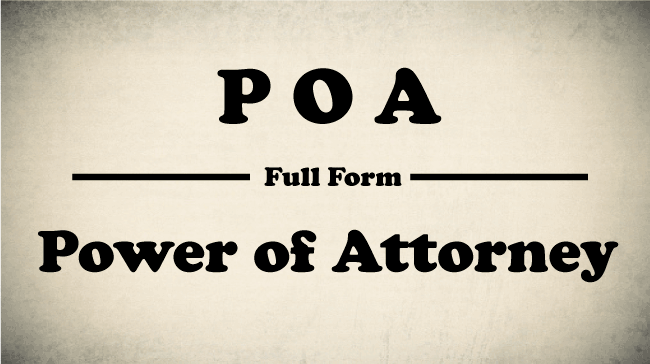What is the full form of POAPOA: Power of AttorneyPOA stands for Power of Attorney. It is a legal term that gives the holder, the power to represent or handle business or other legal matters on behalf of the POA provider. The grantor or principle of the POA is the individual who gives the authority to act on his or her behalf. An attorney is a person who is permitted to act on behalf of the principal. 
Purpose of POAIn a POA, a person can designate who is authorised to make decisions on their behalf if they become unable of doing so themselves or find themselves in a position where they are unable to represent themselves because they are not qualified to do so. The decision-making authority or agent designated to act on behalf of the principal is expected to make decisions that are in the principal's favour. Due to the variety of POA kinds and their many intended uses, the POA has many diverse purposes. Features of POAThe following are the features: 1. Public Document A power of attorney is a legal term that must be notarized in order to be accepted and made public. As a result, this POA enables a person or legal entity to appoint a legal representative to act on his behalf in any form of legal action. It is clearly mentioned in this document that the agent has the right to act on behalf of principal. 2. Unilateralism The unilateralism of a power of attorney is a defining characteristic of the document. This indicates that the granting of a POA does not require the consent of the person receiving it, and conversely, the person awarding the POA must be present at the time of the notary while doing so. 3. Simple It is quite easy to grant or establish a POA because all that is necessary is for the granter to go to the court and apply for it, person must also be of legal age and in full control of his or her mental faculties. Types of POAThere are many varieties that can be made; however, the most common and important types are covered below:
Advantages of POA
Disadvantages of POA
ConclusionA power of attorney (POA) is a legal document (accepted by the government) that enables the person who holds it to act as the grantor or principal's agent. The principal should appoint a trustworthy agent to assist in helping to make judgments that could be advantageous to the principal.
Next TopicFull Form
|
 For Videos Join Our Youtube Channel: Join Now
For Videos Join Our Youtube Channel: Join Now
Feedback
- Send your Feedback to [email protected]
Help Others, Please Share










